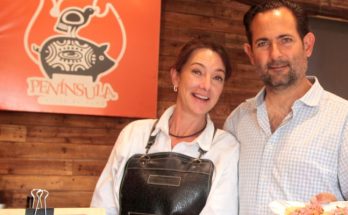By Carolina de la Cajiga
Food fermentation became fashionable a few years ago and has continued to grow the old-fashioned way: by word-of-mouth. How else can such proliferation be explained, without massive advertising from supermarkets and food producers? It is possible consumers have realized the health benefits of this ancient technique and are now taking responsibility for their own well-being.
Fermenting is a craft anyone can do in their kitchen without having to be a chef, a biologist, or a food engineer. This doesn’t mean it’s easy; the process requires dedication and perseverance. To make it simple, to ferment is to apapachar (from the Nahuatl, meaning embracing and caressing the soul) the approximately 39 billion microorganisms that coexist within each one of us. Microbes, impossible to see with the naked eye, were the first inhabitants of the Earth. Approximately 4,000 million years ago, they generated the atmosphere that gave life to everything that has existed, exists today, and will exist.
For millennia, different food preservation methods were developed, and fermentation is just one of many that were forgotten with the arrival of industrialization and refrigeration. We now know these innovations remove nutrients, thus causing countless diseases. This brought back the old fermentation practice. In other words, estamos dando vuelta a la tortilla (we are turning the tortilla over, that is, going back to the origins). Hippocrates, the father of medicine, said, «Let thy food be thy medicine and medicine be thy food,” and this is still true 2,500 years later.
Fermentation multiplies B vitamins and essential amino acids, eliminates toxins and pathogens, enhances food taste, and makes it more digestible. We have much for which to thank our ancestors. Through experimentation, they discovered that fermenting amplifies the alcohol and acids in foods such as flour, milk, and honey, which, in turn, increases the potency of the microorganisms. The ingestion of these nutrient-rich foods strengthens the digestive and other systems in the body. Fermented food is not magic nor miraculous—it just opens the door to a healthier lifestyle.
In San Miguel, we are fortunate to have Sole Saburido, who has a Ph.D. in biology. She has turned her extensive scientific knowledge and her maternal grandmother’s hands-on teachings to practical use. In her artisanal workshop, Saburido produces a variety of fermented products such as drinks, cheeses, and meads, as well as natural cosmetics and health products. Most of them are from different regions of the world, which she adapts to Mexican produce.
Every week, she prepares 40 liters of fermented beverages, plus several kilos of fermented fruits and vegetables. The predominant scents in her shop are floral, fruity, and yeasty; some fresh and some aged. When entering her shop, one can tell the time of year just by the fragrances that permeate the space. By closing your eyes, you will reawaken your senses and recall the succulent aromas and flavors of your youth.

Accomplishing this production requires tremendous organization. Saburido explains, «My Sundays start by washing and sterilizing the glass containers, all recycled to protect the environment. On Mondays, I fill the bottles, label them, and pack them to be ready for distribution on Tuesdays in various spots around town. As I deliver the orders, I pick up the previous week’s containers. Sometimes I wish I had four pairs of arms and legs.” Sighing, she resumes, “When done, I restock what’s needed, take inventory and do the accounting.” After a break, she continues, “That same afternoon or evening, depending on how the day went, I start the next production cycle. On Wednesdays, I finalize the short-term fermented products. The next day, I inspect and feed the cultures. Several times every day, I need to burp all the brews to prevent explosions because of the pressure generated during the transformation. Each bottle makes a unique fizzing or hissing sound—a kind of abstract music.” She takes a deep breath. I can see in her expression she’s incredulous, recalling all she does. “Every Friday, I send out order forms to make sure I’ll have enough products for the following week. Saturdays are for general clean-up.” With a playful gesture she says, “And then, I collapse.” But she doesn’t; she starts the process all over again. Candidly she states, «I’m surprised to see what I have achieved, and the warm welcome I’ve received from the community.”
In addition, there is the housework and the care of her seven-year-old son and four-year-old daughter, which she shares with her husband. She recognizes it would be difficult for her to achieve her goals without the help of another superwoman, her right-hand helper, Lucha, who has 10 children, and her own duties.
«Some weeks I teach face-to-face and online fermentation courses. I love to share my discoveries as well as my frustrations. Microorganisms are living beings that produce unexpected results. They help me to flow without ego and accept whatever life brings. I am passionate about spreading these ancient processes of oral tradition and helping others on their path to creating their own ferments.” She says, “One has to keep learning and evolving.”
“When a bottle explodes from gasification, I want to explode as well. Maybe I didn’t pay enough attention.” She turns to the ceiling, decorated with pink stains from a bougainvillea kombucha which blew-up. Smiling while touching her head and face, she reveals, “I was recently sprayed by ginger beer. It was not pleasant. But then I got a message from a client saying, ‘Your kefir is the best I’ve ever tasted,’ or, ‘I never imagined eating sauerkraut. It’s so delicious!’ It’s like a shot in my veins. It energizes me, and I fall in love with my ferments again!”
You can find Saburido at Fermentos da Meiga on Instagram, on Whatsapp at 415 125 85 56, fermentarmeconecta@gmail.com, and at Deli Q, in Colonia Guadalupe.
If you know someone you would like us to feature, please send their contact to editorial@atencionsanmiguel.org




